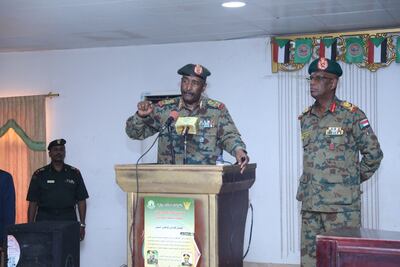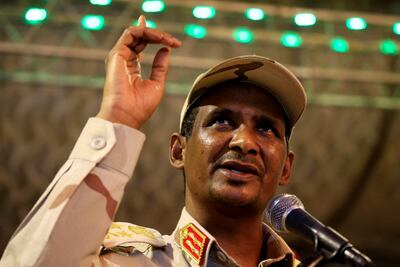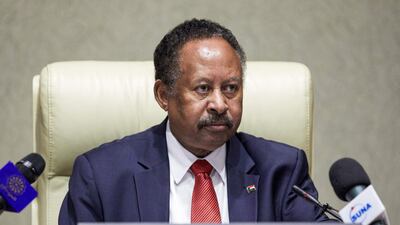Not long ago, Sudan’s pro-democracy politicians and army generals had nothing but mutual praise for their partnership in the post-Omar Al Bashir transition to democratic rule.
Even as tensions grew and distrust deepened with time, the two sides continued to tout their alliance as an inspiring example for the rest of Africa.
Then came last week’s failed military coup.
Bitter recriminations followed the attempted takeover on September 21. The facade of unity and common purpose marketed by both sides has perhaps been irreparably damaged, throwing the future of Sudan’s transition into deep uncertainty, Rasha Awad and other analysts said.
Political leaders and army generals have always been at loggerheads, taking their differences public for the first time since signing a power-sharing deal two years ago.
They have blamed each other for the country’s many woes while claiming the higher moral and patriotic ground. This acrimony has intensified speculations on a possible coup by army officers taking advantage of the popular discontent fuelled by an acute economic crisis.
Ms Awad, who is also the editor-in-chief at online newspaper Al Taghyier, believes the military is likely to again try to seize power.
“Last week’s attempted coup was not the real coup,” she said. “The real coup is the one being plotted by the military component of the transitional administration led by Gen Abdel-Fattah Al Burhan and his regional backers.”
The politicians have also threatened to bring the “masses” out on the streets to “protect the revolution” if the military does not show its commitment to the transition to democracy and respect for the politicians and activists who masterminded months of street protests against Al Bashir’s rule.
However, the power of politicians to mobilise has significantly diminished, with most Sudanese now preoccupied with their daily struggle to make ends meet.
Divisions between the pro-democracy politicians and activists have also devalued their standing among the masses.

Of the 65 years of independent Sudan, the generals have been at the helm for more than 50. The democratically elected governments have often failed at resolving challenges, such as ending civil wars or overhauling the economy.
But amid a dramatic change in Sudan's socio-political landscape, a military coup may no longer secure power for the plotters, analysts and activists contend.
Sudanese activists have used the power of social media to organise and mobilise. And the freedoms that came with the ousting of Al Bashir, they say, are difficult for any government to roll back.
“The citizens may be discontented, but a coup will not content them either,” Prime Minister Abdalla Hamdok said in response to charges of negligence and power abuse levelled against him and his government ministers by Sudan’s head of state, Gen Al Burhan, and his deputy, Gen Mohamed Hamdan Dagalo.
While the generals may not relish the prospect of handing over power to civilians, they can't attempt a power-grab given the backlash it would trigger, said prominent Sudan expert Hany Raslan at Egypt’s Al Ahram Centre for Political and Strategic Studies.
“The generals don’t want to leave power but they also cannot just keep the power,” Mr Raslan said. “They are more likely to try and change existing arrangements with the civilian politicians.”
His view is echoed by Sudanese activists such as Sulaima Ishaq, a lecturer at Al Ahfad university who took part in the “December Revolution” and is now a prominent civil society figure.
“Everyone realises that a coup will send the country back to being a pariah state and more years of crippling isolation,” she said.

Gen Dagalo said on Saturday night: “Let us be clear: we have pledged before God from day one to shepherd the Sudanese people to democracy. Military regimes have been useless.”
But his comments and similar words by Gen Al Burhan have not been taken at face value by some, who continue to question the intentions of the military.
“There is no substitute now for the revolution to correct its course," Ms Awad said. "The civilians in the administration need to regroup and reconnect with the people. The Sudanese are totally opposed to coups and that’s something that should be built on.”
Her view that the military remains set on seizing power is not without evidence.
Gen Al Burhan, the head of the Sovereign Council, has been acting in an increasingly presidential manner of late, going it alone on major foreign policy decisions and speaking of the military as the land’s ultimate source of power.
He went on record last week reminding the politicians of the vast power the military wields and emphasising that the generals alone were in charge until elections were held.
Under the power-sharing deal signed in August 2019, Gen Al Burhan would be the country’s de facto president for 21 months before a civilian takes over from him for the remaining 18 months of the transitional period leading to elections.
However, a peace deal reached with rebel groups in October 2020 prompted an amendment of the power-sharing deal, adding 14 months to the transitional period.
The military and the pro-democracy movement, known as the Forces of Freedom and Change, differ over the exact date of the handover, but have asked the justice ministry to arbitrate.
“The problems are made worse with every passing day," Mr Raslan said. "The divisions in the ranks of the Forces of Freedom and Change and the splintering of the traditional political parties are not making things any easier. The transition simply cannot continue like this.”































